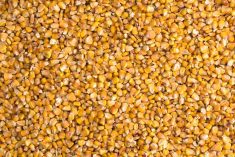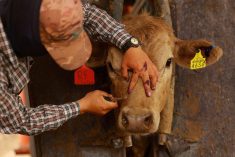A decision to pull out of the exporter-unfriendly European beef market has resulted in 75 layoffs at Alberta processor SunGold Specialty Meats.
“That’s unfortunately a very painful process,” said Howard Oudman, general manager of the plant at Innisfail, about 30 km south of Red Deer.
“It’s painful for the owners, but it’s even more painful for those families who have been directly impacted by the loss of jobs.”
The SunGold plant — formerly Sunterra Meats and, before that, Canada West Foods, Lambco — was bought in February by Canada Gold Beef with an eye to establishing a branded beef line.
Read Also

U.S. grains: Wheat futures rise on supply snags in top-exporter Russia
U.S. wheat futures closed higher on Thursday on concerns over the limited availability of supplies for export in Russia, analysts said.
“We’ve made a considerable amount of physical improvements and upgrades to the plant in both infrastructure and equipment,” Oudman said. “And that had dual purpose for both beef and lamb, but the plan is very much now towards making this primarily a lamb facility given the situation with the EU quota.”
It was hoped the European Union quota system would create opportunities for Canada to export beef across the Atlantic, but it’s not working out that way, said rancher and beef promoter Christoph Weder, who markets a branded beef line, Heritage Angus, in Europe.
“It’s actually acting almost like a tariff again because there’s extra costs in the system and it either slows the beef down by making it too expensive, or some companies just can’t sell their product based on that,” said Weder, whose beef is processed at a Lacombe plant.
The problem is twofold, he said. First, some meat companies that don’t import meat are applying for a slice of the so-called Hilton quota, which allows 23,000 tonnes into the EU with a tariff of 20 per cent. They then sell the quota to companies that want to import, which drives up their costs.
As well, this new system has encouraged exporters in countries such as New Zealand and Uruguay to target Europe, increasing competitive pressure on more traditional exporters such as Canada, the U.S. and Australia.
“Frustrating”
The cost and uncertainty of exporting to Europe wasn’t worth it, said Oudman.
“We had been slaughtering a reasonable number of EU protocol cattle every week; we’ve suspended that business and decided that we’ll really focus on building the lamb business,” he said.
A number of companies are pressuring the European Commission to put an end to the selling or trading of quota, but no quick resolution is expected, said Weder.
SunGold decided it simply couldn’t wait for reforms, said Oudman.
“It’s quite disheartening and frustrating,” he said. “We’ve spent an inordinate amount of time in discussions with our government officials and trade negotiators and the reasons are what they are, and they’re just unable to rectify what had been very clear market accessibility to now making it really unprofitable.”
The 75 layoffs represent more than half of the plant’s workforce, but Oudman said the SunGold plant, currently the largest lamb processor in Canada, plans to increase that side of its business.
“We’re at just over 1,000 (head of lamb) a week and we would like to increase that upwards of 1,500 a week,” he said. “We still do some beef and some bison on a custom basis, we’ve kept that line going for one day a week. But we’ve reduced the beef kill and processing by approximately 300 head.”
— Sheri Monk is a reporter with Alberta Farmer Express. The full version of this article appeared Oct. 6, 2011 in the Manitoba Co-operator (page 26).















